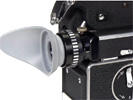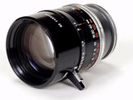Entertainment Technology News
| Featured Vendor: What's New at Shelton Communications - Cameras, Lenses, and Filters By Staff posted Dec 15, 2009, 08:00 |
What�s New at Shelton Communications
Cameras, Lenses, and Filters
Shelton Communications (www.sheltoncomm.com), which specializes in Super-16mm, and regular 16mm motion-picture equipment, cameras, lenses, and accessories, is a dealer in used motion-picture equipment, caters to the needs of education institutions, and invites filmmakers and videographers of all levels, as well as production companies to check out new and popular items for your motion picture production needs.
Shelton Communications is featured in the Volume 5, No. 1 Edition of StudentFilmmakers Magazine, the # 1 Educational Resource for Film and Video Makers. Read the accompanying online Q&A with Martin Shelton here.
 Could
you tell us a little bit about yourself and your background in
the industry?
Could
you tell us a little bit about yourself and your background in
the industry?
Martin Shelton: I earned my Master of Arts degree in Cinema from the University of Southern California. For 35 years I worked in the information/documentary film/video industry. I retired from active production a several years ago. Started my equipment business to keep my hand in the industry.
What kind of package would you recommend for a new filmmaker
or new videographer who's just starting out? What items would
you include in the package?
 Martin
Shelton: Depends on many factors. However, the key word
is "new." Often times I get phone calls from beginners
with overly ambitious goals. For example, "I want to make
a movie." Me, "What kind of movie?" New one, "I've
got this idea to make a film about ...." Me, "With actors
in sync-sound?" New one, "Yes." Etc., etc. Always,
I discourage these overly ambitious goals for a beginner. I recommend
a simple camera, such as the Bolex, Cine Special, or Bell &
Howell model 70 - affordable lenses, and a tripod. Gear down your
goal and start at the begining. Shoot a film without sound. Add
narration, music, and sound effects in post production. It's easier
and much less costly to remedy errors in the simpler films. As
your skills develop, upgrade to a sync-sound system - either film
or video.
Martin
Shelton: Depends on many factors. However, the key word
is "new." Often times I get phone calls from beginners
with overly ambitious goals. For example, "I want to make
a movie." Me, "What kind of movie?" New one, "I've
got this idea to make a film about ...." Me, "With actors
in sync-sound?" New one, "Yes." Etc., etc. Always,
I discourage these overly ambitious goals for a beginner. I recommend
a simple camera, such as the Bolex, Cine Special, or Bell &
Howell model 70 - affordable lenses, and a tripod. Gear down your
goal and start at the begining. Shoot a film without sound. Add
narration, music, and sound effects in post production. It's easier
and much less costly to remedy errors in the simpler films. As
your skills develop, upgrade to a sync-sound system - either film
or video.
What are some new things going on at Shelton Communications?
Martin Shelton: Recently, we acquired a large collection of Arriflex SR cameras, Zeiss lenses, Illumina lenses, TV camcorders, 4x4 filters, and lots of "stuff." Currently, we are in the process of inventorying this equipment, and having it serviced by expert technicians. In a month or so we'll post it on my web site, sheltoncomm.com.
What can you say about some of the changes you have you seen over the years in relation to film and video, and the motion picture industry?
Martin Shelton: I'm amazed at the rapid transformatin from film to digital. The computer has revolutionized our industry. Nowadays, a person with a personal computer can produce an effect that use to take a speciality house several days to complete. In fact, folks can produce an entire film on their computer. Unfortunately, I see problems with this trend. Technology has become the main componet of film. Story, plot, etc are secondary. Accordingly, too many films today are technology excellent, but lacking in story.
Has current trends affected filmmakers' and videographers' camera and equipment choices?
Martin Shelton: Absolutely. Today, the digital
camcorder is light weight, powerful, and highly efficient in capturing
and storing first-class images. Nonetheless, film cameras still
have a market. And I suspect, for many years hence, will continue
to be used by the those who prefer the "film look."
Digital recording of images will never match film images. Digital
records images via pixels - a item consisting of thousands and
thousands of molecules. Today's "T" grained film records
images at the molecular level.
 And
decisions to buy versus rent?
And
decisions to buy versus rent?
Martin Shelton: Depends. Too many factors to
detail here. However, several prime considerations are: long-term
or short-term use, capitol equipment fiscal depreciation, maintenance
cost, use equipment on hand or rent from a vast array of other
equipment to meet current requirements, etc.
What are some of the new items, cameras, and equipment
you're offering at Shelton Communications?
Martin Shelton: Arriflex SR-2s with video taps,
Arriflex SR-1 some with video taps, Zeiss MK III, Super Speed
set of five-lenses in PL mounts; Illumina set of Super-Speed six-lenses
in PL mounts, Zeiss 12mm to 120mm T2.4 zoom lenses, an array of
Zeiss prime lenses, Canon model XL1S Mini DV camcorder; and over
100 4x4 Tiffen glass filters. And lots and lots of other equipment.
 What
are your most popular products?
What
are your most popular products?
Martin Shelton: Surprisingly, it is the Bolex
RX series of cameras and the Switar RX lenses.
What are some camera buying and renting tips? Give us three things people should take into consideration?
Martin Shelton: Planned use. Skill of the user. Camera capabilities.
What would you say are three must-have's in a camera
package?
Martin Shelton: Vendor integrity. Reliability
of the equipment. Meet current (and future) requirements.
If you could share advice to filmmakers and storytellers around the world, what would it be?
Martin Shelton: "The play is the thing." Use technology to enhance the plot - never as an end to itself. Technology has made it too easy to produce a film/video. Lost is the art and craftsmanship of filmmaking. Too many of us are seduced by "creativity." Creativity is a vastly misunderstood and misused value, whose effectiveness is an inverse ratio to its noticeability. True creativity is seldom tricky, bizarre, spectacular, or obviously "clever." In fact, creativity, is more often basic and deliberately concealed. Know your audience and produce to engender empathy in your audience. Without empathy the film will fail.
Tell us about your book, "Communicating Ideas with Film, Video, and Multimedia," which earned the Best of Show award in a major publication competition.
Martin Shelton: For those of your readers who have that burning desire to understand this media to the depth of their souls, I recommend that they read and re-read my book, "Communicating Ideas with Film, Video, and Multimedia." Published by the University of Southern Illinois University Press. It is availabe on Amazon.com and BarnesAndNoble.com. There is no technology in my book - none whatsoever. Rather, I focus on the foundation of our profession: the psychology of film, communications, audience analysis, and scripting.
![]()
Resources:
Shelton Communications: www.sheltoncomm.com
